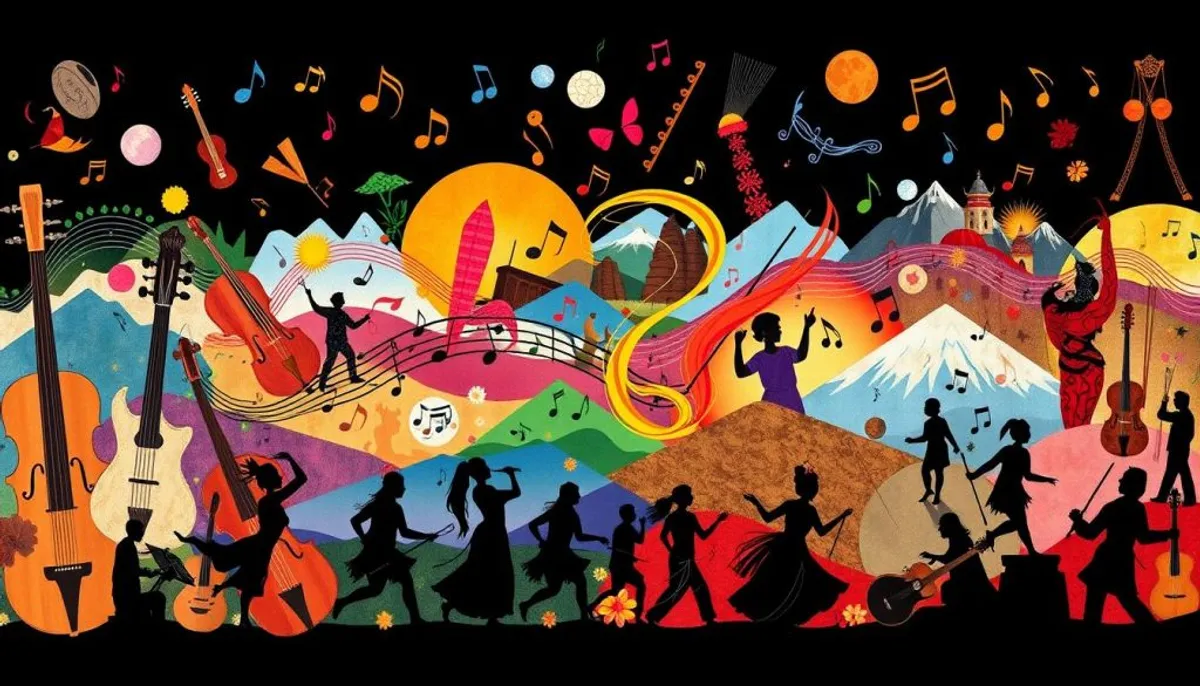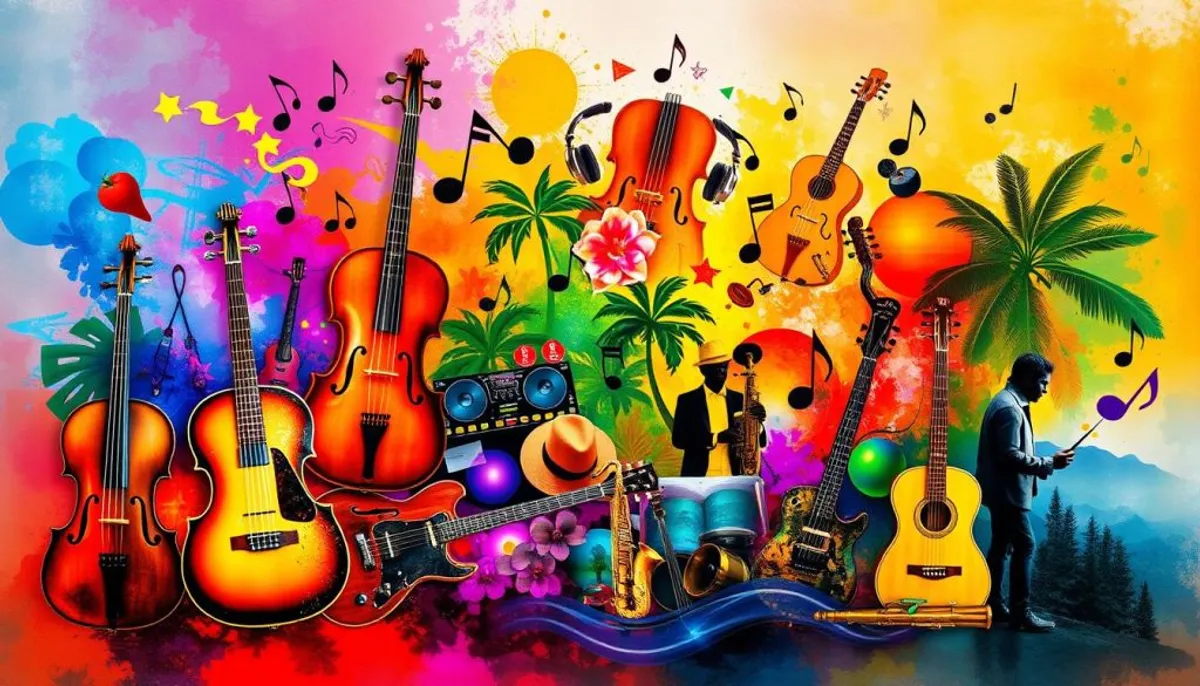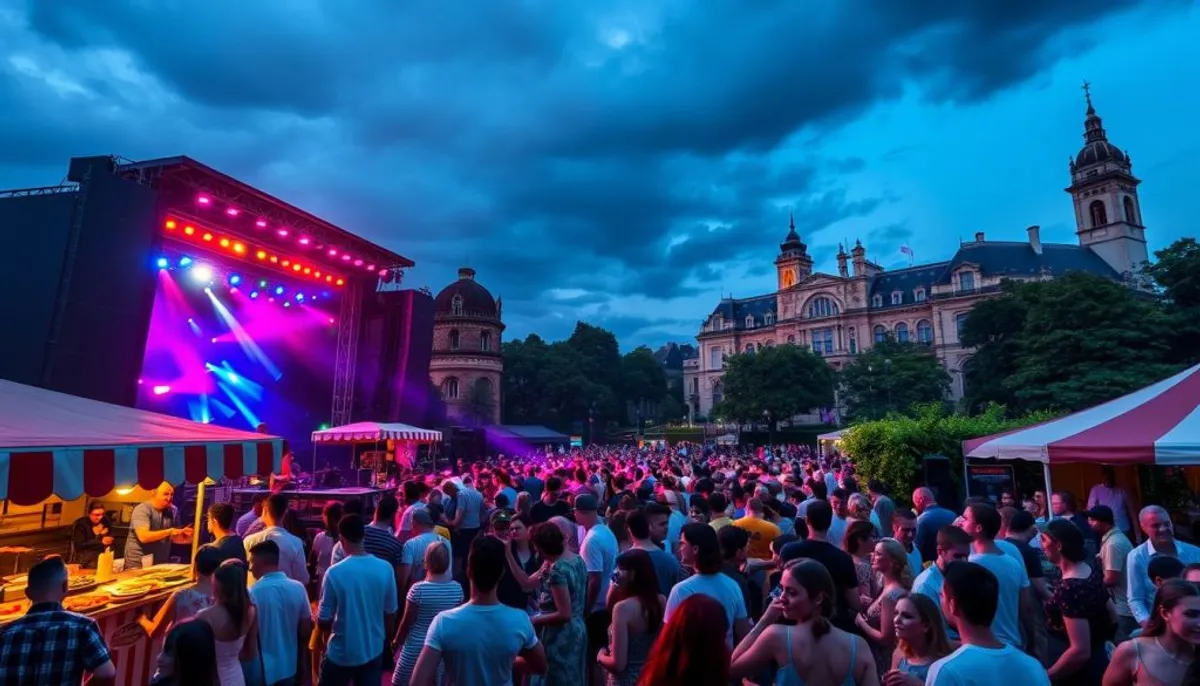The musical culture, a true treasure, is constantly enriching itself. It opens the door to new sound universes, thus fostering artistic flourishing. This guide aims to enhance your knowledge of various musical genres, allowing you to expand within the musical universe.
The musical diversity is essential for a rich and vibrant culture. It prevents boredom and stimulates creativity. By exploring different styles, you sharpen your taste and your critical sense. This sonic journey around the world is exciting.

Today, musical discovery is made more accessible through various tools. Streaming platforms like Deezer or Spotify offer personalized recommendations. Websites like Whosampled.com allow you to explore the samples of your favorite tracks.
Festivals are ideal places to enrich your musical culture. In Europe, each genre has its major event: Rock Werchter for rock, Hellfest for metal, or Tomorrowland for electro. These events are sources of inspiration for music lovers.
It is important to note that 95% of young Europeans listen to music every day. Music is a universal language, accessible to all, regardless of age or social background. Whether you are a musician or a simple listener, music is a universal language to explore.
The importance of a diverse musical culture
Musical diversity is essential to enrich our auditory experience. It allows us to navigate through a varied sound universe, full of emotions and discoveries. A recent study revealed over 200 emotions related to music listening, grouped into 22 emotional categories. Among them, enthusiasm, attention, and surprise are the most frequent.
Avoiding musical monotony
Exploring different musical styles is crucial to avoid monotony. Musical initiation workshops for children have highlighted six methods to experiment with music. These varied approaches stimulate interest and promote deeper musical learning.
Developing your critical sense
A diverse musical culture is essential for refining your critical sense. By comparing different genres and artists, one develops the ability for analysis and musical appreciation. This skill is crucial in a constantly evolving musical landscape, influenced by the arrival of digital giants and the transformation of the industry.
Enriching your artistic references
Enriching your artistic references involves discovering new artists and genres. The music festivals, of which France has about 1,800, offer an excellent opportunity to broaden your horizons. Despite the presence of major events, small local festivals continue to thrive, illustrating the richness of the French music scene.
- Explore different musical genres
- Attend various concerts
- Listen to diverse playlists
- Participate in musical workshops that celebrate the harmony of nature and culture
By cultivating a diverse musical culture, one opens up to new creative perspectives. One develops a deeper appreciation of musical art in all its complexity.
How to have a good musical culture
Acquiring a rich musical culture is an enriching journey, requiring active listening and curiosity. Starting by following your desires is a good starting point. However, to progress, it is crucial to practice active listening. This involves paying attention to every detail of the piece.
An effective strategy is to listen to an album by an artist in a genre different from your preferences each week. This practice broadens your perspectives and stimulates your musical analysis. By identifying the patterns and codes specific to each style, you sharpen your understanding of various genres.
Curiosity and an open mind are crucial for developing a rich musical culture. Explore genres such as rockabilly, heavy metal, and hip-hop that emerged in the 70s in the United States. Each style has its own history and singularities to explore.
| Method | Advantages |
|---|---|
| Active listening | In-depth analysis, better understanding |
| Discovery of new genres | Broadening horizons, musical diversity |
| Musical practice | Solid musical culture, concrete experience |
| Reading about music | Deepening theoretical knowledge |
It is important to remember that musical tastes are personal. Sharing your discoveries with friends enriches your musical culture. In this exploration, Google culture plays an essential role in influencing our preferences. Whether through practice, reading, or concerts, each experience enriches your musical development.
Digital tools for exploring music
The digital age has introduced a multitude of tools to broaden our musical horizon. From streaming platforms to recommendation apps, these technologies transform our way of discovering and appreciating music. They offer an unprecedented musical experience, opening doors to new discoveries.
Music streaming platforms
Music streaming has revolutionized access to music. Spotify and Deezer, two giants in the field, offer vast catalogs. With over 120 million active monthly users, SoundCloud has established itself as a major player. These services use sophisticated algorithms to suggest new tracks, facilitating musical discovery.
Music discovery sites
Specialized platforms enrich our musical culture. Reddit, with its 60 million daily users, is full of communities dedicated to music. Bandcamp, adding thousands of new tracks every day, is a treasure for music lovers. Hype Machine, for nearly twenty years, compiles new musical gems daily.
Recommendation apps
Music apps refine our tastes. Last.fm analyzes our listening habits to suggest similar artists. Shazam identifies the tracks heard, opening the door to new discoveries. These tools personalize our musical experience, guiding us toward unexplored sounds.
Despite their advantages, these technologies have an environmental impact. Digital represents 3 to 4% of global greenhouse gas emissions. It is crucial to use these tools responsibly to preserve our planet while enriching our musical culture.
Exploring different musical genres
The history of music is rich in varied musical genres. Understanding this diversity enriches our musical culture. It allows us to appreciate the evolution of musical currents over time. Let’s dive into this fascinating universe.
Major historical musical currents
Musical genres have evolved over the centuries, reflecting social and cultural changes. Jazz, which emerged in the early 20th century, revolutionized music with its syncopated rhythm. French jazz, in particular, managed to capture the essence of this era while adding a unique touch. Rock, which emerged in the 50s, marked a generation with its electric guitars. Hip-hop, on the other hand, emerged in the 70s, giving a voice to urban communities.
Popular contemporary genres
Today, the music scene is dominated by various styles. Pop appeals to a wide audience with its catchy melodies. Electro attracts fans of synthetic sounds and dance rhythms. Rap, the heir of hip-hop, remains a powerful means of expression for youth.
World music
World music offers a window into the musical traditions of different cultures. From Spanish flamenco to Jamaican reggae, and Brazilian samba, each style tells the story of a people. These genres enrich our understanding of cultural diversity through the universal language of music.
| Musical genre | Origin | Characteristics |
|---|---|---|
| Jazz | United States | Improvisation, swing |
| Rock | United States/United Kingdom | Electric guitars, drums |
| Reggae | Jamaica | Syncopated rhythm, prominent bass |

Exploring these different musical genres allows for a deeper appreciation of sound art. Each style has its own codes and unique history, contributing to the richness of our global musical heritage.
Resources to deepen your knowledge
Exploring music requires access to a variety of resources. Musical biographies offer a unique look at the lives of artists. They reveal the influences and artistic paths of musicians, providing a fascinating insight.
Musical encyclopedias are a goldmine for music lovers. They cover a wide spectrum of genres and eras. These essential references allow for exploration of music in all its aspects.
Music blogs are a constant source of discoveries. They offer current analyses, album reviews, and thematic playlists. These interactive platforms keep you informed about the latest musical trends.
Specialized magazines provide detailed analyses and exclusive interviews. They are essential for keeping up with musical news and discovering new talents. Here’s an overview of the available resources:
| Type of resource | Examples | Content |
|---|---|---|
| Musical biographies | Artist books, documentaries | Life paths, influences, anecdotes |
| Musical encyclopedias | Grove Music Online, AllMusic | History, genres, artists, instruments |
| Music blogs | Pitchfork, Stereogum | Reviews, news, playlists |
| Specialized magazines | Rolling Stone, Les Inrockuptibles | Interviews, analyses, trends |
By using these varied resources, you will develop a deep understanding of music. Integrating local outings and diversifying your sources is essential to optimally enrich your musical culture.
The importance of concerts and festivals
Concerts and music festivals are essential for enriching our musical culture. In France, they attract around 11 million people annually, showing their growing popularity. With nearly 6,000 festivals, 4,000 of which are dedicated to music, France offers an impressive variety of live experiences.

Must-see festivals by genre
France is home to a multitude of festivals for all tastes. The regions of Provence-Alpes-Côte d'Azur, Occitanie, and Brittany are particularly conducive to these events. The Interceltic Festival of Lorient, with 800,000 annual visitors, is the largest in the country. For classical music lovers, the Chorégies d'Orange, created in 1869, is the oldest French festival.
Iconic concert halls
Concert halls offer unique experiences. Each has its history and atmosphere, enriching the French music scene. These venues allow for the discovery of new artists, especially as opening acts for headliners.
Live experiences as a source of learning
The live experience is essential for deepening one’s musical culture. It allows for an appreciation of artists' performances in their real context, offering a unique dimension to music. Statistics show that 19% of French people attend at least one festival per year, highlighting the growing importance of these events in cultural life.
| Characteristic | Data |
|---|---|
| Number of music festivals in France | 4,000 |
| Percentage of festivals created after 2000 | 70% |
| Average age of festival-goers | 48 years |
| Percentage of women in the audience | 61% |
Conclusion
Musical enrichment represents an exciting journey, requiring curiosity and open-mindedness. By exploring various genres, from classical symphony to electroacoustic music, one develops a rich musical culture. Statistics reveal that 90% of composers improve their skills through this diversity.
Artistic evolution requires regular practice and continuous learning. 100% of recognized composers emphasize the importance of daily dedication. The use of digital tools, attending concerts, and deepening theoretical knowledge are crucial. 85% of professional musicians highlight the importance of mastering the fundamentals of music theory.
Musical curiosity encourages experimentation with different tempos, intensities, and vocal formations. This approach stimulates creativity, improving creative output by 50%. Open-mindedness allows for an appreciation of music in all its diversity, from melancholic melodies to dance rhythms. This enriches our personal musical experience.
RelatedRelated articles


